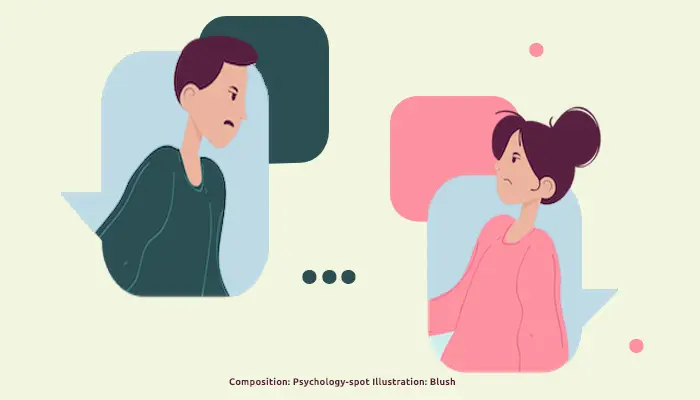
There are exhausting people. We can call them also emotionally draining people. These people consume our time, energy and sometimes also our patience. After that encounter we feel psychologically tired, as if they drained our emotional energy.
Their attitudes and words deplete us, so these people end up becoming true saboteurs of calm, balance, positivity and, ultimately, our happiness. Unfortunately, we are not always aware of the impact of these types of reletionships on our psychological health, so we continue to drag their negative influence.
The 5 most common types of exhausting people
There are different behaviors that can produce this psychological drainage, so it could be referred to different exhausting profiles:
1. Spin Doctors. They are usually people with excessive egos who assume an arrogant attitude in their relationships. They think they know everything and always have an advice or criticism for us. They tell us what we should do and how we should do it, so dealing with them is simply exhausting.
2. Chronic dissatisfied. These are people who develop a demanding attitude because they don’t feel satisfied with anything and always want more. They are unable to see their achievements and focus on the positive because they always have their sights set on what they lack, so that relating to them ends up being exhausting.
3. People with martyr complex. These people continually draw attention to their misadventures and sufferings. Their dialogue usually becomes a scratched record that repeats everything they have done for the others and their ability to immolate themselves, so our problems and needs are always relegated to a second or third level.
4. Constant complaining. This is one of the profiles of people who are most exhausting since they always have a problem for each solution. They are highly pessimistic people who make of complaint their way of life, often assuming the attitude of victim. They are authentic specialists in breaking down any plan and hope, staining our hope of gray.
5. People with a narcissistic personality. These people demand so much attention that they become exhausting. They experience an excessive need for admiration and will do anything to achieve it. They believe they are unique and special, so they despise others and only use them to reaffirm themselves. Their deep self-centeredness is what ends up draining us emotionally.
Negative emotions spread twice as fast as positive emotions
Exhausting people can be found everywhere: at work, among our friends and, of course, within the family. They absorb our positive energy to feed their inexhaustible hunger for negativity, leaving us exhausted, exhausted and unhappy. They behave like an “emotional garbage truck”; that is to say, they carry with them a huge load of negative emotions that turn on the first person they meet.
These people are often charged with fears, grudges, prejudices and negative thoughts. When their “emotional container” is about to overflow, they project all that negativity on others, leading to a real emotional contagion.
In fact, psychologists at Harvard University found that negative emotions are transmitted much faster than positive ones following a pattern of spread quite similar to that of viruses. For every friend who experiences negative emotions, our chances of feeling unhappy are doubled.
Another study conducted at the University of Florida revealed that when we are victims of rude attitudes, we are more likely to respond in the same way in other situations, an attitude that we can drag for a whole week.
That means that “negative” emotions are not only more intense, but also more lasting, they provoke a stronger response and can negatively influence our attitudes, decisions and behaviors. That is why it is not strange that relating to pessimistic, spiteful or stressed people ends up exhausting us.
How to deal with emotionally exhausting people?
• Determine your acceptance threshold
Above all, it is important to be aware that every relationship is made up of two people, which means that there are individual differences in what everyone considers exhausting or draining. It can be tiring for one person to relate to people who constantly complain, but others may have more difficulty dealing with narcissistic behaviors. Therefore, it is important that we know our threshold of acceptance and be aware of those behaviors and attitudes that generate more psychological exhaustion.
• Stop wishing they were different
Expectations are one of our main sources of frustration. When we have to deal with stressful people, we need to readjust our expectations. Thinking that everyone should be kind, empathetic and willing to help is simply unrealistic, so we must begin to accept that there are people who are more self-centered, pessimistic or do not know how to listen. It is not about labeling them but precisely going further to discover other positive qualities. After all, nobody is completely bad or completely good. We can also be exhausting at certain times.
• Do not let everyone enter your circle of trust
The people around us and with whom we interact every day, will end up exerting an enormous influence on our mood, whether we like it or not. Therefore, it is important that we be more selective when choosing those who are part of our circle of trust and influence. That does not mean that we should cut off relationships with the people who exhaust us, but we can dose and space the meetings, so that we can better deal with their consequences.
• Do not wait them to read your thoughts, communicate your limits
People cannot read our thoughts, so it is important to provide a feedback. Many times exhausting people are not fully aware of the impact of their behavior, so letting them know about it can help them improve their relationship with others and with themselves. Without resorting to recriminations or unnecessary blame, we can explain what we don’t like and propose a more assertive way of relating. It is about building bridges and looking for points in common but without losing sight of the limits.
Sources:
Foulk, T. et. Al. (2016) Catching rudeness is like catching a cold: The contagion effects of low-intensity negative behaviors. J Appl Psychol; 101(1): 50-67.
Hill, A. L. et. Al. (2010) Emotions as infectious diseases in a large social network: the SISa model. Proc Biol Sci; 277(1701): 3827-3835.



